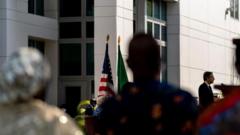The interplay between President Trump’s criticism of Russia and the Kremlin’s response indicates shifting diplomatic dynamics, as both sides reassess their strategies amid ongoing tensions related to Ukraine.
Moscow Responds to Trump's Critiques: A Complex Diplomatic Landscape

Moscow Responds to Trump's Critiques: A Complex Diplomatic Landscape
As tensions rise, the Kremlin remains unfazed by Trump's remarks on Putin and Russia's involvement in Ukraine.
In a recent development, President Donald Trump expressed frustration towards Russian President Vladimir Putin, revealing a growing tension in the already delicate US-Russia relations. As reported by Steve Rosenberg for the BBC, Trump's criticism—especially following a less-than-productive phone conversation with Putin—signals a notable shift from earlier warmer interactions between the two leaders. The response from the Kremlin, however, was notably composed, with spokesperson Dmitry Peskov stating that they remain calm and hopeful for continued dialogue with Washington.
Komsomolskaya Pravda aptly summarized the fluctuating nature of Trump’s stance towards Russia, noting that he oscillates between friendly overtures and sharp criticisms. This was exemplified by Trump's comments at a recent cabinet meeting, where he described the conversations with Putin as producing "bullshit" and voiced his discontent with the lack of progress on the Ukraine conflict.
Consistent with this critique was an imminent threat from Trump to impose tariffs on nations associated with BRICS, suggesting that his administration is increasingly viewing global alliances with skepticism. The shift in tone from the US complicates the diplomatic landscape, with the Russian press recalling Trump’s earlier favorable policies that once suggested a cooperative stance towards Moscow.
The Russian media's current portrayal vacillates between skepticism about Trump's geopolitical achievements and mockery of his political maneuvers, indicating a turn from prior positive coverage. As an example, the tabloid Moskovsky Komsomolets articulated doubts about the absence of consistent US diplomatic efforts, contrasting them with earlier optimistic perceptions that characterized the Trump administration's approach.
Despite the cooling of relations, the Kremlin appears intent on maintaining diplomatic channels. However, there is a clear understanding that future negotiations may be complicated by Trump’s demands and frustrations regarding Ukraine. Several observers have noted that Putin likely perceives an opportunity to negotiate from a position of strength, particularly given the continuing discord in US policy approaches to the Ukraine crisis.
As the situation evolves, the outcome of Trump’s decisions—particularly concerning military assistance to Ukraine and possible sanctions against Russia—will be critical in shaping the future of US-Russia relations. The potential for miscalculation on Moscow's part could lead to unforeseen consequences, challenging their current strategies. Astraightforward interpretation of events, however, seems illusory given Trump's unpredictable nature and the dynamic context of international relations.



















